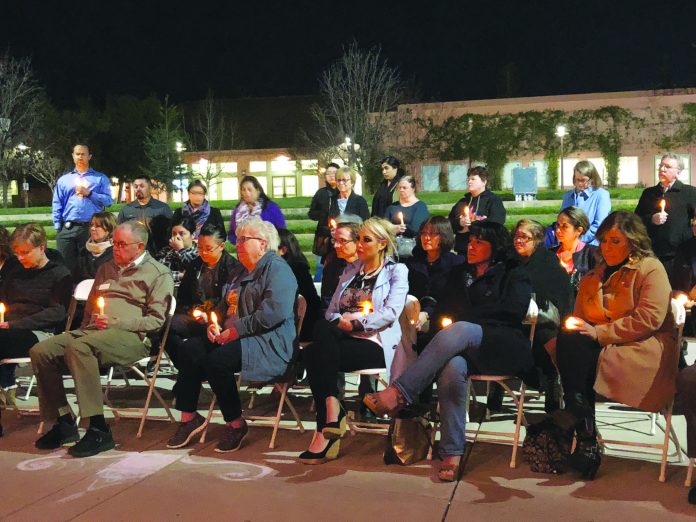Forty years ago, Lupe Arellano and Laura Gonzalez-Escoto founded “La Isla Pacifica” (translated to “The Peaceful Island”), a confidential shelter in south Santa Clara County for victims of domestic violence.
Today, the location of La Isla Pacifica—which has been under the umbrella of Community Solutions since 1996—remains a secret to protect the victims and their families while they build new lives free of violence from those with whom they were once intimately involved.
“One of our goals was to put ourselves out of business, for us not to exist,” explained Arellano, who was the first manager of La Isla Pacifica, a 24-hour, seven-day-a-week safe haven. “We wanted to make ourselves obsolete because society would become advanced to the point where there was no longer domestic violence.”
Much to the chagrin of the two women’s rights pioneers, domestic violence remains prevalent. News headlines of sexual assault, misconduct and domestic violence among some of the most powerful figures in the movie industry, government and sports—as well as the #metoo movement on social media sites such as Twitter—have made the issue more front and center now than in the past.
Arellano explained when a woman called the police to say they were in danger 40 years ago, an officer would come to the scene and ask if everything was fine. Usually, Arellano continued, the abuser would downplay the violence and let the officer know they worked things out while the victim would be cowering in the corner afraid to speak up.
“(Domestic violence) was the only crime where it was left up to the victim to arrest the perpetrator,” said Arellano, who helped develop South County’s first “underground railroad” for women looking to escape domestic violence.
In 1978, the shelter provided services for more than 180 women and children. La Isla Pacifica provided services such as counseling, medical attention, legal assistance, home relocation, transportation and advocacy.
“There was no crisis line in South County at that time,” Gonzalez-Escoto recalled. “We began servicing Santa Clara County and San Benito County—mostly Morgan Hill, Gilroy, San Martin and Hollister.”
Helping victims
Since then, countless domestic violence victims have passed through the doors of La Isla Pacifica. At first, the shelter could accommodate up to 30 people at a time (some would bring multiple children with them in hiding). If there was not a bed available, they would look elsewhere.
“The beauty of it all was just life at La Isla. There was so much sharing and caring,” said Arellano, a veteran of the U.S. Women’s Army Corps. “We would have 21 clients at a time, including their children. We would pick them up at the police department or another safe place. Then, we would get them the services they needed. Some we would put on a Greyhound to go somewhere.”
Gonzalez-Escoto added: “We were able to get some women into permanent housing….And we would provide them with clothing, food and furniture. We had a cadre of volunteers helping to lift us up.”
The founders took to every source they could think of for funding and began networking with other similar shelters in Northern California to combine resources and not overlap services. In 1993, a more permanent funding source came as the state passed the Presley bill that reserved a portion of marriage license fees to support domestic violence.
“We spoke in front of the state assembly. We went to the governor….We went to anyone who had influence at that time,” Gonzalez-Escoto said.
Along with the funding, law enforcement began to “criminalize domestic violence” and Gilroy became one of the first cities in Santa Clara County to give out general orders on how to handle a domestic violence call. Arellano said that she and other members would go to the police departments in Gilroy and Morgan Hill, as well as the sheriff’s office, during shift changes and train the officers on what to look for when on a call. That also allowed La Isla Pacifica to apply for grants from law enforcement agency grants, which they received for the first time in 1976 and five subsequent years.
Then in 1996, La Isla Pacifica merged with two other organizations—South County Alternatives and Bridge—to form Community Solutions, which has offices today in Gilroy, Morgan Hill, Hollister and south San Jose.
“That’s when the new name Community Solutions was born,” said Community Solutions Division Director Perla Flores, who explained that the new group is divided into divisions by services provided. In Morgan Hill, they focus on solutions to violence, including domestic violence, sexual assault and human trafficking. The La Isla Pacifica shelter is operational and run by Community Solutions.
“The need is still there and awareness is key,” said Flores, who detailed the Community Solutions model of Protection, Prosecution, Prevention and Partnership. “I still think we have a long way to go….Domestic violence continues to affect so many.”
Flores added that domestic violence happens whenever one person exerts power and control over another, and it does not have to be physical.
Growing awareness
The awareness and support has grown exponentially, with 94 shelters across the state. Flores ran off the different organizations and consortiums such as the California Partnership to end Domestic Violence (which pushes for policy and advocacy along with funding) as well as the Domestic Violence Advocacy Consortium. Along with Community Solutions, other domestic violence providers involved are Asian American Community Services, Next Door Solution to Domestic Violence, Maitri and the YWCA. Flores noted that the California Office of Emergency Services provides the biggest chunk of funding for domestic violence.
Bringing more help and awareness, Community Solutions hosts a weekly South County Family Justice Center, where visitors can seek domestic violence and victim-witness advocacy as well as free, on-site advice from an immigration and family law attorney; and speak with a domestic violence police detective or the supervising district attorney.
On Feb. 15, dozens of residents joined Community Solutions in a candlelight vigil held at the Morgan Hill Downtown Amphitheater to honor survivors and those lost to domestic violence.
“When we started the shelter, (domestic violence) was not talked about,” Arellano said. “A big change is now people will dialogue about it openly.”













